#that's something that's unfairly drilled into people by their environment
Note
do you have any particular thoughts regarding marcille being a half-elf? its interesting to me considering the fact that she seems self-conscious about being a half-elf, but denies it when its brought up
i remember marcille looking visibly uncomfortable over laios simply asking her how old she is, which i think the only reason she might feel nervous about this is because it might reveal her as a half-elf to him.
she's never corrected anybody whose called her an elf either.
never mind the circumstances of the reveal, in which thistle goes on about how half-elves are inferior and accusing her of wanting to become full blooded elf, she seemed particularly upset like he struck a nerve-
i wish the half-elf thing was built upon more. also, underrated marcille line:
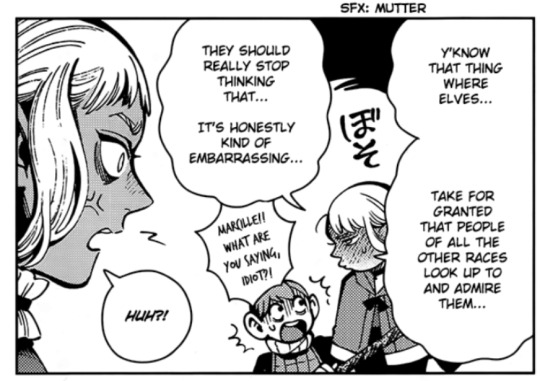
okay so i revisited this sequence just to make sure I could back myself up and it's just... man. there's a lot going on.
the first reaction we get from Marcille is this huge panel that takes up half of the page
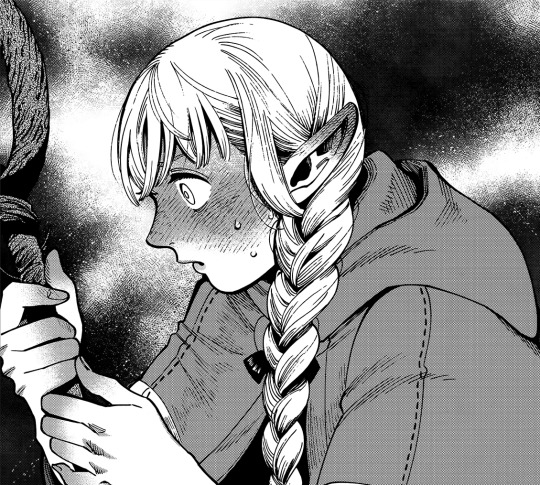
she is viscerally affected. flushing to the tips of her ears with the intensity of it. and we see it again, a few pages later
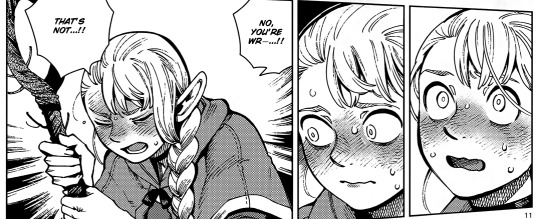
so it might seem like she's embarrassed about it and lying to herself, but... I really think it's just that Thistle is accidentally hitting sore spots. If you really look at what he says to get these reactions
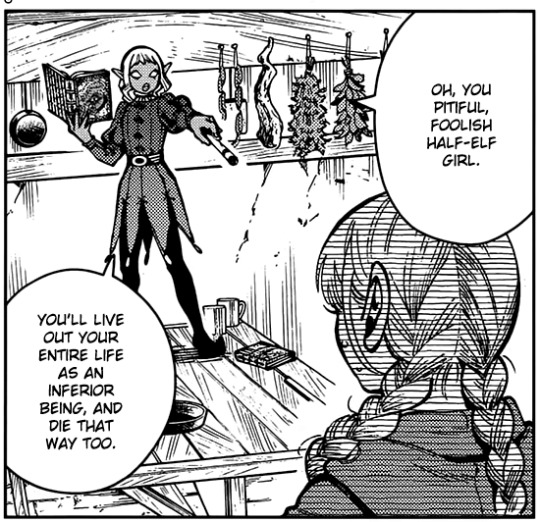
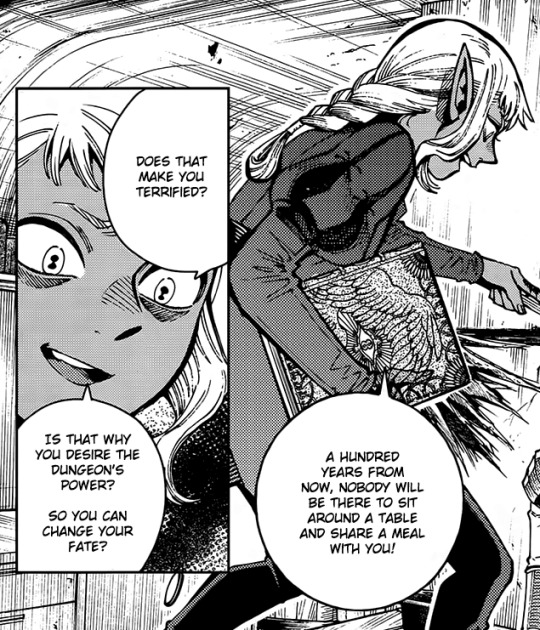
"you'll live out your entire life [...] and die that way too"
"a hundred years from now, nobody will be there"
Hear me out. I think, if he stuck to harping on about her inferiority without bringing up how terrifyingly long-lived she is, she wouldn't have been as bothered. But right now, Thistle is accidentally hitting all the marks on Marcille's deepest fears-- and this is after the Winged Lion promised her that her dreams could come true in an extremely vulnerable moment, so it also hits her slightly guilty conscience as well.
I do truly believe that Marcille isn't bothered about being a half-elf the way that people assume she'd be bothered by it. To her, the biggest problem with being a half-elf is that it's isolating.
On one hand, it's not hard to imagine why she'd distance herself from elves in the west. A lot of them can clock her as a half-elf on sight, unlike other races, and therefore she's always branded with this weird stigma of being Othered -- I would even say that she considers herself lucky for being born outside of elven culture instead of having to grow up in it. I mean, just... look at the way elves talk about her.
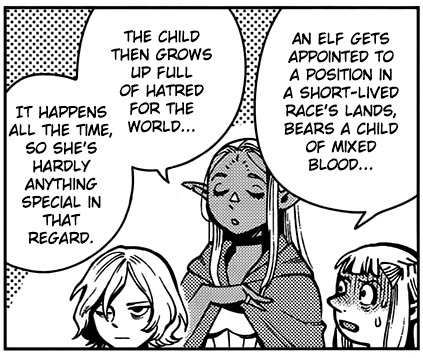

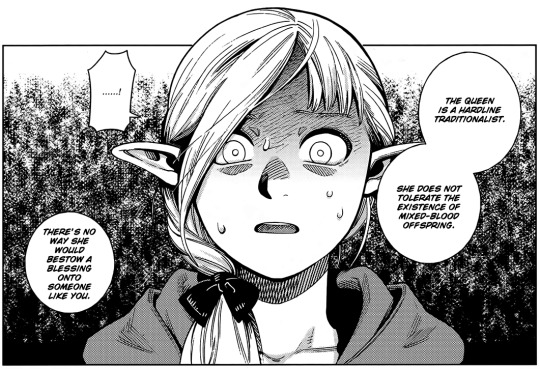
Skipping past the uncomfortable implication of what 'not tolerating the existence' of half-elves would actually entail, this is incredibly fucking annoying. You can see why she wouldn't want to be around elves much. You see a lot of Marcille reacting badly here, but honestly, almost all of it can be attributed to her freaking out that her bluff completely failed. She's honestly more paying attention to Izutsumi's footsteps and trying to coordinate an opportunity to escape.
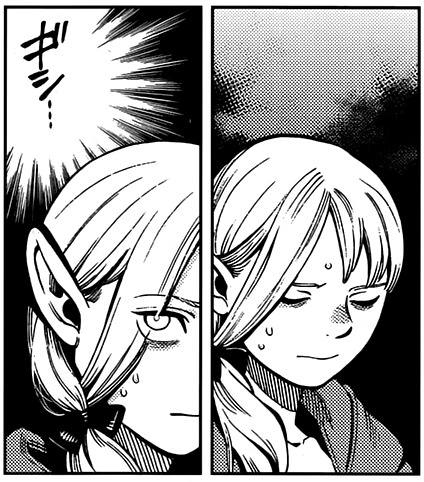
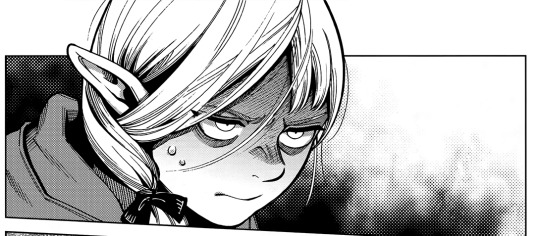
And in the end, you see her built-up frustration at being asked if she wants to be a full-blooded elf like 2-3 times in a row.
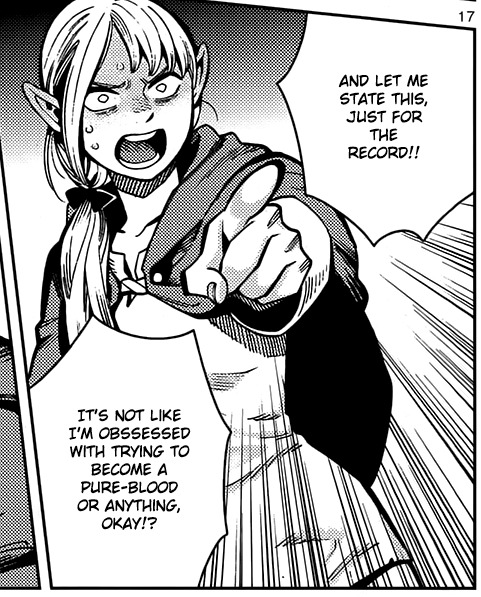
Yeah, yeah, "the lady doth protest too much," and all. But we know Marcille. We know that she's a lot more embarrassed and horrendously unconvincing when she's being prodded about something she's actually self-conscious about.
Moving onto the flipside of things, it might seem weird that she "pretends" to be a full elf around other races, but it's not really that strange if you think about it. Again, people are weird about her being infertile or whatever, and a lots of them don't even know much about what sets half-elves apart from everyone else. I mean, look at how uncomfortable Laios is just asking her about it
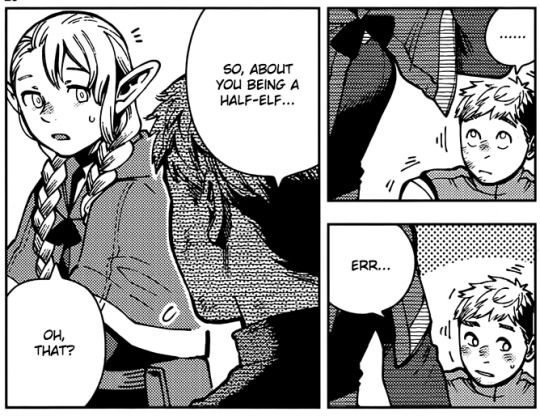
and look at how exasperated and resigned she looks
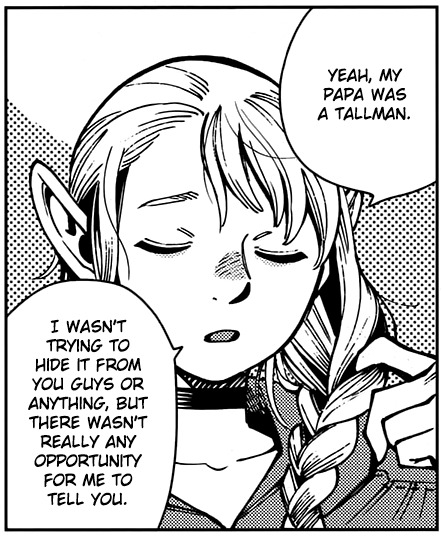
And like... she's right. Where would that come up in normal conversation? Why would she go out of her way to tell them? She's functionally a normal elf to other races anyway -- got the ears, the abnormally long "childhood", and the huge mana capacity. Unless it's directly relevant or important for people to know, I don't think it's all that strange or indicative of insecurity that she prefers not to bother with it.
(This combined with her sense of being an "outsider" to elf culture also explains why she thinks elf superiority is embarrassing. She sees the way elves treat short-lived races from the "outsider" perspective nonetheless, and thinks it's obnoxious; especially more so because she usually has to play the elf around short-lived races and deal with the reputation of arrogance that elves have built up.)
The sad thing is, this all means that... she doesn't actually fit in anywhere. She doesn't like going out West much because of how elves treat her. But she's also an outsider in the continents she was born in, treated like this exotic long-lived alien choosing to live among short-lived races for some reason. She is always an outsider, the Other, no matter where she goes. Add in the fact that she'll live longer than literally anyone she knows, and it's honestly kind of heartbreaking.
And I think that's the crux of it. Marcille really doesn't act like she's at all self-conscious about being a half-elf because of any feelings of inferiority or being half-made or whatever. She considers herself a perfectly legitimate being and might even, in some ways, consider herself superior to normal elves because she's not blind with elf supremacy or whatever. (And whatever "elven biases" she displays, all of them are born more out of the fact that she's kind of bad at conceptualizing how other races age and mature compared to herself, not that she actually considers herself better or more mature simply for being an elf.)
I think that whatever self-consciousness Marcille has about being a half-elf is, instead, related to terror and loneliness. The reminder that it ensures she'll never truly belong anywhere for the rest of her very long life. The reminder that, in truth, even she's not actually sure how old she is by other races' standards (hence the discomfort when asked how old she is). She doesn't want to not be a half elf, or be a full elf or full tall-man-- in her ideal world, she's still a half-elf. She just gets to live out her life at the same pace with the people she loves and doesn't have to say goodbye again and again and again until she dies.
and one last very important panel, right after Mithrun tells her that all her desires would be devoured
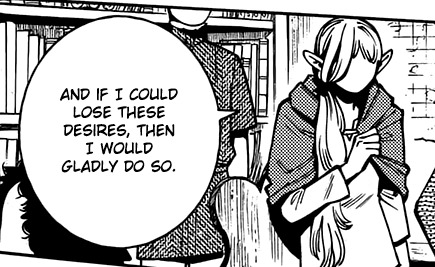
In her ideal world, she's still a half-elf and reality magically starts marching at her pace. But failing that, the second best thing is that she's still a half-elf-- but one who is able to accept reality and let go of her fear.
(But the rest of the story pans out the way it does because, to Marcille, taking reality apart and reshaping it was less scary than simply and fully reconciling with it.)
#asks#dungeon meshi manga spoilers#marcille donato#manga panel analysis#this is probably riddled with typos sorry#readmore cut bc it got long lmao#i ended up babbling about it bc it's such an important character detail to me#bc like... wow. she's so normal about it. she's literally just chilling.#the only thing that really bothers her is the material reality of it and how people treat her#the stereotypes the stigma etc. etc.#otherwise it just..#literally doesn't factor into her criteria for self-worth at all#the basic truth is that marcille likes herself on a fundamental level#she's not plagued by a deep and festering self-loathing the way a lot of characters in her archetype are#she likes herself and is proud of her successes and accomplishments#its just that shes terrified of failure and can have *episodes* of self-loathing when she fucks up#but who doesn't yknow#i know its a very slight nuance that makes very little difference in how her 'overachiever' problems manifest but its there#the sword of abandonment issues that hangs over her head has nothing to do with her self-worth or self-esteem or meeting her own standards#it has to do with the fear of not living up to *other* people's expectations and not being useful enough to be worth keeping around#she's good enough for herself but she's always so so so scared that she's not good enough for other people#i wont say much about what ryoko kui is saying using this as an allegory for real world racial biases but#dungeon meshi's treatment of marcille's relationship with her being half-elf is so incredibly important to me because it gets it so right.#a trauma about inferiority or being a half-being isn't inherent to the experience of being 'of two worlds' at all#that's something that's unfairly drilled into people by their environment#the *inherent* anguish is the loneliness. the constant longing. the fact that you are always homesick no matter where you are#always just a little bit of an outsider and never fully at home#and dungeon meshi gets that.#edit: cleaned it up a little
72 notes
·
View notes
Note
Hello. I have no one to talk to about this irl and I saw that you are also Palestinian and Muslim so I thought I’d take my shot and ask. I’m Muslim and I love my religion with all my heart. I hate to say this, but sometimes I feel like I’m held back, or that I have to choose between two worlds. I want to experience the ‘bad’ things in life. The things I’ve been told I’ll burn in hell for. Mainly relationships and …figuring out my sexuality. But I feel like god will abandoned me. I feel like I can’t just go pray and do or think these things. But if I don’t experience these things or accept myself then I’ll never be able to grow as a person.
Salam Anon! I am sorry you have nobody you can speak to about this IRL. First of all, I love you and you're not doing anything 'bad' and everything will be okay.
I apologize in advance if this is a long-winded reply, and I focused a lot on being Queer and Muslim, though I think there are a lot of things conservative Muslims unfairly demonize which this can apply to. And forgive me if I start to sound preachy later on ~
I think living in an environment where it's drilled into you that an inherent part of yourself is evil and wrong is something I wouldn't wish upon anyone -- and it's something I think even non-Muslim queer / gay / trans people experience as well.
Still when it comes to Islam, I know how it is to feel that resources are not there and if they are they're hard to find or inaccessible.
(below the cut 'cause it got long)
I don't know what environment you have grown up in, friend, whether you grew up in a predominantly Muslim country or you grew up in a Western country. But I can relate either way to growing up afraid of thinking about these things, and I hope some part of my experience helps you!
I spent my formative teenage years in Jordan, a predominantly Muslim country, and my parents were, and still are, incredibly conservative Sunni Muslims and while, looking back, I was clearly a young lesbian, I didn't really allow myself to think on my attraction to women because, the way I was raised, even picturing myself in that situation filled me with revulsion and disgust. It made me viscerally uncomfortable. But being with men also made me feel disgusted (because I was not attracted to them LMAO).
But like you, I also love my faith and don't want to leave it. I will say, after years trying to find a place in Islam where I feel comfortable, my advice is to remember the following:
Allah (SWT) is the most merciful. That is one of the things that is repeated the most in the Qur'an. Allah (SWT) loves His creations more deeply than any love in existence --whether they are doing "bad" things or not and His forgiveness is only conditional on whether your repent for your actions is pure.
While it sounds nice to try and find Hadith and stories about the Sahaba that "prove" that being queer is okay after all and you've owned the homophobes with logic and facts, that is actually a trap. There will always be differing interpretations of Hadith and Sunna and it will be a vicious cycle of "What if I was wrong about my sexuality" and "No I was actually right all along" and it's exhausting. You have to lead yourself to a point where it doesn't matter if you find justification for who you are. (Certainly straight Muslims never have to do that)
It was narrated by Omar Ibn Al-Khattab that Muhammad (PBUH) said: إنما الأعمال بالنيّات ، وإنما لكل امريء مانوى ، فمن كانت هجرته إلى الله ورسوله ، فهجرته إلى الله ورسوله ، ومن كانت هجرته لدنيا يصيبها ، أو امرأة ينكحها ، فهجرته إلى ما هاجر إليه (Translation: Verily actions are by intentions, and for every person is what he intended. So the one whose hijrah was to Allah and His Messenger, then his hijrah was to Allah and His Messenger. And the one whose hijrah was for the world to gain from it, or a woman to marry her, then his hijrah was to what he made hijrah for.) And this is also something that brings me guidance when I feel unsure if I'm doing the right thing -- whether that's with my faith or in life. Your intent matters and it always does -- at least in the eyes of Allah (SWT). And if your intent is to understand yourself and the world around you without hurting anyone, then that is between you and Allah (SWT)
Nobody can tell you that you're going to hell except Allah (SWT). Not even Muhammad (PBUH) can tell you if you're going to hell. You do not know if you're going to hell. In Islam, it is easier to go to heaven than to go to hell and don't let anyone convince you otherwise.
Culture affects your perception of how 'bad' something is. There are far worse sins that Muslims commit on a daily basis without having a crisis of faith. That's the arrogance of conservative Muslims. They will play Qur'an 24/7 on in their house and with those same hands beat their children and gossip and judge others unfairly.
Take it easy on yourself. Breathe. Everything will be okay and you are not a bad person or a bad Muslim for wanting to better understand yourself.
I know what works for me is not "one size fits all" so take with a grain of salt. But basically, what I gently advise is to explore. Do what you need to do to strengthen your faith.
I can't tell you what you'll discover as you do this. Maybe you explore your sexuality and have relationships and you find out you're not gay? That's okay. And if you find out you are actually gay/trans/bi/pan/lesbian/queer...etc? That's fine. You can still be Muslim. Allah (SWT) still loves you. You're not doing a bad thing. Even if you're acting on those feelings.
I'm sorry this got so long, but please if you ever need to reach out, you are also welcome to DM me off anon anytime you want <3
46 notes
·
View notes
Photo

Twin drills Ref
name: Twin Drills
nicknames (even though she hates nicknames) : twiny, twin twin, drills
Designation number: TD-00707-Si
gender: femme
faction: autobot
alt. mode: ginetta G60
personality:
twin drills is quite polite and well mannered, however, when angered she will not be afraid to take action. when she talks she is usually firm and direct. she wants to get a point across. she always takes a minuet to analyse the situation before making her move. being a top spy for a mysterious firm, she needs to be on her toes at all times in case something happens. this has lead to some cases of staying awake at night, secretly panicking. she has yet to get this problem checked out due to her schedule. she use to also be a headmistress/professor for a top school back on cybertron. she is known to actually be very gentle to younger sparks and does what she can to help them. she has been known to fire teachers who have broken her trust if they have unfairly punished a student and doesn't tolerate teachers picking on students. she may be prim and proper but she has been known to have a genuine smile. there have been rumors circulating that she had fallen in love at some stage and acted different. although, they are just that, rumors. truth is, she is actually super caring. her main issue is her presentation. sometimes she does look a little like a try hard when acting all proper. she wants to maintain her atmosphere of elegance but she has been notorious for letting little things slip by accident, such as getting distracted here and there. she also doesn't always realize that her voice can do harm. something she said might have good intentions but the way she projects it can come out differently. because she speaks firmly and a little loudly, her intention might come off as warning or something else negative. she also isn't very good at adapting to any new changes to her environment, earning her a small reputation of being fussy/picky. sometimes she says the truth when she shouldn't. she's an analyzer, but sometimes she forgets that not many people are asking for what she thinks. but aside from that, she's been known to be a loyal friend and comrade and believes in leaving no bot behind.
bio:
Twin Drills grew up in a middle-class family. she had studied criminal psychology before perusing a career in teaching. her efforts in recognizing student talents and giving them new ways to learn soon earned her the position of being a headmistress at a university. she eventually fell in love and became conjunx with a laborer and fleet leader Blackout, who she met when he was working on a site close to her university. she bumped into him frequently and the two went from acquaintances to friends to conjunxes.
however when the war began, Twin Drills tried to keep things stable. she eventually was forced to close down the university due to dangers of the war. she made a plan with Blackout to escape, but a skirmish separated them. because Blackout had been persuaded to Join the decepticons, the autobots who found her assumed he was dead, and relayed this information to twin drills.
developing rage for the Decepticons who took her students hopes away, and for the death of her conjunx, she joined the Autobots.her knowledge in how Decepticons think from her studies in criminal psychology lead to her earning the rank of a spy. she was known for taking down decepticons undercover and gaining intel. her work helped her move up the ladder to become a top agent to the autobots, eventually leading her to become part of a top secret elite firm. when she arrived on earth, she became a link between autobots stationed elsewhere as well as a master spy for the autobots. she searched for any decpeticons in the Europe area.
one fateful mission had her investigate con activity during a patrol when she was met with an unexpected surprise, her conjunx still alive. she practically broke down in tears seeing him again and the two of them had an emotional reunion after she came to accept he was alive. she began to meet up secretly with him and discovered information about what the decepticons were giving her conjunx as compensation. she stayed with him when he refused to go back. however, she didn't hear from him. she got worried that early morning and began to search for him.Twin drills had found blackout injured and quickly got him to the medbay. She explained the situation to optimus. She and blackout had a conversation about him wanting to switch sides and she told optimus that she wanted to help him. Given how unsure of how he’d react, she left out her relationship with blackout. when he asked about switching sides and the team's general reaction of him, he decided to go neutral instead.
Since that was the only thing they could agree on, blackout went neutral. Twin drills was allowed to visit him and give him a supply of energon whenever he needed it. she's still a major spy for the autobots, but has slowed down to be with her conjunx
other facts:
-her “birthday” is the 5th of may
- she wears "glasses". she understands that they are annoying but contacts are even more annoying to take out.
- the drills on her head used to work. used to. because they span with her emotions and made alot of noise, she simply got them deactivated. she keeps them because it shows off her class.
- her British accent is a yorkshire accent. sometimes it's hard to understand
2 notes
·
View notes
Text
I’m just so incredibly frustrated and upset with everyone in my life and I’m so glad Tumblr is a safe platform where I can genuinely be expressive of my mental health and how I’ve been feeling, because it’s been a while.
I struggle with Borderline Personality Disorder (BPD) and within the Disorder, there are 4 sub-categories - one of which I identify as ‘Quiet’ BPD which is a little dissimilar to the general conception of what BPD is.
I’ve also been diagnosed with Depression and Generalized Anxiety Disorder since the age of 12 and have been on medication for about 7 months.
I struggle on and off with Atypical Anorexia and have recently been diagnosed with Body Dysmorphic Disorder.
To begin with, life has been one huge emotionally tumultuous ride for me. The trauma that my childhood has cursed me with has done nothing but collateral damage in my life now.
Growing up, I was the only child who spent the bulk of my time being alone. I was socially awkward and failed to assimilate with my peers in school and was bullied for being unable to fit in.
I was sent away at the age of 9 all the way up till 12 to the hands of an abuser - whom I’ve forgiven as of today. I hate to blame this on my parents because I know they truly meant well at that point of time and wanted the best for me, but the emotional and mental scars this whole torment has left on me has been carthatic and unimaginable.
It’s eroded my self-worth and perception of myself over the last few years, and the fact that I never truly talked about this openly to anyone has led to a lot of pent-up anger and resentment and unresolved trauma to accumulate within me.
I love my mom, I know she loves me to death and till this day she cries over her decision of sending me away. The main reason she’d sent me away was because both my parents were busy building their business empires when I was younger and was unable to commit to me. growing up in a strict Asian household who pride themselves on elitism and academics, she believed that I’d flourish academically and be more well-behaved under the guardianship of someone who supposedly had the resources to nurture me when my mom couldn’t.
Not only was I a victim of physical abuse, being hit, slapped and pinched over the trivialest of reasons - all pertaining to academics by the way - such as not being able to grasp a maths formula / doing badly in a test and witnessing my childhood friend at the time getting beaten and slapped and caned and yelled at under the same roof as me on a daily basis and bearing the brunt of emotional abuse (getting told that I was never good enough, I was never smart enough, that I’ll never be academically successful, that I was useless) and being consistently compared to other children slowly tore away my self-esteem and happiness.
My guardian had a rigid routine that we had to adhere to, and most of it revolved around relentless studying and tutoring by her. There were hardly any breaks and not performing up to par academically would risk facing disciplinary action by her. Neither her child (my friend) Nor me were rebellious. We were obedient, compliant and hard-working. We had to lock ourselves up in the room and face long, tedious hours of studying and cramming, as young as at 9 and 10 years old, and had to face the constant prospect of my abuser exploding out of the blue.
I remember feeling an overwhelming apprehension, anxiety, fear, inadequacy as a child and I grew up feeling helpless and restricted in this mental and physical chokehold. I would hide in the toilets for a little longer and outside the house as I was deathly afraid to thrust myself back into a war-zone. It was a daily cycle of praying that I’d make it through the day without crumbling. Some days were bearable, other days were not. I had to witness how my friend got beaten, slapped and pinched by my abuser over yet again, the silliest of reasons and the constant chaos and mayhem in the house made me incredibly fearful. I was under constant pressure to be on my best performance, but I was still victim to being hit, pinched and yelled at - all because I didn’t understand a math formula or an algebraic equation. I’d subsequently be called “stupid” and “dumb” and every other degrading labels you could think of, that I slowly started to believe that the labels defined who I was. 3 years of such abuse being drilled relentlessly in you, a 9 year old child, just imagine.
As a child, you internalise everything that you’ve been told, and this unfortunately sticks with you throughout adolescence and adulthood.
At that point of time, I was so incredibly young that I had no idea that the physical and emotional abuse I endured wasn’t ‘NORMAL’, until years later when I finally got into therapy. I had no clue that this was almost illegal and unlawful.
I couldn’t escape from the situation then and I remember telling my parents about what I had to go through. I didn’t tell them in precise detail about the horrific abuse that I endured, as I couldn’t muster enough courage to tell them everything. I yearned desperately for my parents to salvage me from such a precarious and emotionally jeopardising situation, for them to save me and hug me and tell me everything that I’d put up with so far was awful and undeserving, but for some reason, I ended up being invalidated and accused of lying by my very own parents.
Not only was I falsely accused of fabricating about being hit, my dad thought I was conjuring up these “lies” because I was lazy and that didn’t want to do well in school. He then proceeded to discipline me by forcing me to kneel down and caned me, despite my desperate attempts to convince both my parents that I wasn’t lying and that I needed help. I didn’t know what I was doing wrong, and I felt like I was being punished for something I hadn’t done. I continued to address the issue several times throughout the 3 years, only to be trivialised and disregarded again and again. Instead of raising concerns and being empathetic, my dad proceeded to admonish me for not fairing exceptionally in school, and begun comparing me to other children, telling me that I should be more “like” them and to quit being lazy and a compulsive “liar”, and to stop making up excuses to be away from my abuser.
I felt stifled, disappointed and let down. I was broken when my mom continued not doing anything and enabled my abuser to continue abusing me. For 3 years, I was stuck in this inescapable loop of emotional, mental and physical torment and I was made to feel as though everything was my fault, and that I deserved to be treated this poorly.
Not to mention - the Singapore education system is one of the harshest and strictest systems in the World. There’s colossal emphasis placed on academics, even at a young age, and failing to produce adequate academic results would result in ostracisation and physical discipline from our parents.
That, compounded by the pressures of school, a chaotic upbringing and environment, gradually affected me in the worst ways possible.
I remember shedding tears and crying hysterically when I was younger, whilst I was being hit, seeing my friend being beaten and caned right in front of my eyes was as equally disturbing, gut-wrenching and frightening. It’s as though we never knew when she would erupt, things were so unpredictable that I was walking on eggshells throughout the 3 years. I never knew when a beating would herald, or when the torrent of emotional abuse would strike me.
I would pray and beg for my mom to fetch me and save me from the chaos, and felt betrayed and abandoned each time she chose not to do so. I felt unprotected, unsafe and misunderstood. I begun to believe that I was a liar, after my parents’ countless dismissals of what I was going through. I felt like a mistake, a burden, and didn’t understand why I was so unfairly subjected to being forsaken, abandoned and dismissed and abused.
I didn’t know if it was appropriate to cry or be emotionally afflicted about this. For years, I’d genuinely regarded physical discipline (hitting, slapping, on pinching) on children as something that was allegedly intrinsic and normal to society, as well as hurling hurtful, injurious insults, only to realise years later that none of it should be condoned and how I was in fact - a victim of abuse.
I started cultivating self destructive behaviours at the age of 11 and 12, and had to be sent to the Psychologists. When I begun self-harming as an outlet to express my innate anger and frustration, I received even more abuse. The only person who truly cared about me and was concerned for my well-being was one of my teachers, whom I’ll never forget till this day and who has changed my life dramatically ever since. I didn’t intend for my scars to be discovered by anyone around me, and was destroyed when my parents accused me of being “naive”, “impressionable” and trying to follow a fashion trend by cutting. I’d thought that with self-harming, they’d realise just how much pain I was in and rescue me, but unfortunately this wasn’t the case back then. What’s worse, my abuser noticed that I’d been self-harming and started yelling at me and being exasperated and unnecessarily incensed. I was confused by how people around me were acting. Nothing I do seemed to work.
They say the experiences in your childhood paves the way for how you view yourself later in life, and I cannot agree more. This whole ordeal has truly shaken me to the core, and has definitely played an integral part to all my mental issues now. 3 years of my precious childhood was robbed away from me and instead of receiving the love and care that I deserved, at my most emotionally vulnerable, I was cruelly invalidated, shunned away, dismissed and disregarded like a drop of a hat. 3 years of being told I was never good enough, never smart enough, that I’ll never make it, 3 years of witnessing instability, Disorder and mayhem in the household, an emotionally unstable and unpredictable Guardian, 3 years of being physically tortured by someone who wasn’t my biological parent.
Not only has my childhood made me feel utterly worthless and unloveable, this negative belief system has festered in me and till this day, I still harbour and carry such destructive thoughts about myself, which’s certainly done irrefutable damage on my adolescent years, such as leading me to seek out validation and “love” through toxic, malignant relationships due to my abnormally low self-esteem and not feeling loved as a child.
Fast forward - I didn’t know what to feel when my parents finally decided to believe me and was infuriated with my abuser YEARS later and when my mom came crying and apologising to me when she found out all along I’d been speaking the truth as a child.
I still don’t know how to react to this day. I’m confused, hurt and frazzled. I’ve chosen to forgive my abuser and my parents, especially my mom, but what I still don’t understand, and will never understand, is why I had to go through such torment as a child, when I should be loved, nurtured and cared for in the right way.
I spent most of my childhood feeling left-out and alone, fearful and distrustful of people and apprehensive whenever I’m asked to open up.
What hurts me even more is that despite everything I’ve gone through and endured during my nascent childhood and adolescent years (not exclusive to this incident of abuse), there are still people around me who claim to “love” me yet emotionally invalidate me in the most calluous ways possible.
“But you’re rich, your family’s wealthy. You have a nice house, you go to a prestigious University, what the hell do you even have to be traumatised about?”
Not only do they think I’m undeserving of love and support, they assume that growing up for me was peppered with endless merriment, laughter and joy, just because I hail from an admittedly “well-to-do” family, I must be handed with everything in a silver spoon in life and that I do not know jackshit about “real” struggles and that I must be a “spoilt brat”, when I’m nothing but the direct opposite. And it doesn’t help that I’m a high functioning person who is still performing adequately in all aspects of my life despite my barrage of unresolved trauma and mental illnesses - people who meet me for the first time have absolutely no idea about my history or past.
Really? You think years of childhood neglect, emotional, physical, mental abuse, taunting and ostracisation, growing up in an emotionally threatening environment, witnessing violence, chaos, volatility, losing a loved one can be cured with money?
Don’t get me wrong - I’m empathetic towards those who live in poverty and I make an effort to help people in need. I’m grateful to be financially blessed, but my parents being wealthy has absolutely no correlation to my well-being at all. My progress often gets discredited just because of my background, which is absolutely senseless and absurd.
Got A*AA for A Levels and apparently that wasn’t because of my hardwork, it was because I’m “rich”? You’ve got to be kidding me?
One thing stands clear and it is that I’m not a mooch or a leech who takes for granted my privileges and I certainly work my way up to the TOP myself, with my zealous work ethic and drive.
I feel misunderstood and maligned most of the time. I can’t even go about my day, expressing some form of discomfort or my sincere feelings without being undermined and treated as a joke. And I’m hardly ever the person who confides into someone or seeks help unless need be just because I’m so avoidant, paranoid and distrustful of people in general.
There are a lot more formidable things that I’ve gone through in my life which’s shaped me into who I am today, all of which has made the pain even more real, tangible and palpable and contributed to so much of my BPD and depression, which I’ll delve into at some point later.
0 notes
Text
The formal structure of paranoid leftism (why there is no such thing as a noble error)
People who want to think, write, or act outside of what is perceived as normal within currently consituted left-wing circles are now commonly talked about as possible fascist sympathizers. Typically, if you drill down into what is being said exactly, they are not accused of being fascists, they are accused of not clearly enough differentiating themselves from fascism, to a degree that exceeds the currently established expectations of what anti-fascism is believed to look like. When you drill down, the root of the problem (and sometimes admittedly) is reputation: “I know you’re not a fascist but these other people will wonder, ergo I must disavow you as inadequately anti-fascist.”
The problem is that this model of changing the culture is premised on the willful acceptance and promotion of incorrect judgments. Contemporary left culture is premised on the belief that you can change the world through noble mistakes. But as a rule, you cannot change the world for the better by agreeing to make mistakes. You will either fail to change anything because you are operating in a fantasy land, or you will make the world much worse as you try to forcibly deform it around your mistakes. There is no such thing as a noble error. Every error or mistaken judgment that is tolerated or promoted in left culture as “solidarity,” will directly and demonstrably lead to a decreased probability of achieving equality and freedom.
As I have tried to make this argument in the past but typically to closed ears, the purpose of this post is to demonstrate the problem in the clearest, most demonstrable and undeniable fashion, using some basic concepts from my background as a social scientist. Basically, the issue is that for human beings errors are unavoidable, but there are different types of errors and whether we like it or not we make choices about which types of errors we are more or less willing to accept before acting on a judgment. Even more usefully, we can generate some predictions about future outcomes based on which types of errors we decide to be comfortable with. Currently, left culture is deeply invested in reducing one type of error while it is almost infinitely comfortable with a different type of error. As I try to show below, the only possible result is that membership in the organized radical left must ultimately drop to zero, a process I believe is currently underway. I am also able to generate some predictions about the temporal shape of this extinction event that I fear is currently underway. I believe that soon this post will not even be necessary, as the predicted outcomes I outline below come true; but as these outcomes have not yet fully arrived, it is my wager that posts such as this might be enough to make the currently doomed strategies collapse once and for all.
I will focus on the particular example of anti-fascism because it offers an attractively simple and well-known structure of left/right group differentiation. But everything I say here can be applied to a variety of attitudes and behaviors dominant in left culture.
Two different types of error and the example of anti-fascism
Scientists distinguish between Type 1 errors (false positives, you think something exists when it really doesn’t) and Type 2 errors (false negatives, you think something is not there when it really is). If you are one of those people who genuinely believe there is no objective reality outside of our interpretations of it, buckle up.
Whenever we are confronted with a question about something in the world, there is some risk of both types of error. If you maybe just saw a snake in the bush, there is some probability you are right and some probability you are wrong. And you have to decide what to do, so what’s at stake here is not some obscure scientific theory: I am talking about basic unavoidable challenges of being a human. We can either do them intelligently and act on the world effectively (dodge snakes when they are there and relax when they are not there), or we can pretend we don’t have to grapple with them and basically sign-up to be helpless victims of our environment (never really run and never really relax, but just accept you’re probably going to get eaten by a python eventually so whatever).
This scenario is exactly analogous to the problem of anti-fascism. If there is someone in our movement for collective equality who is actually sympathetic to fascism or likely to say/do things that help fascism, then we probably won’t want to work with them. This is reasonable enough, and it is widely seen as a serious and urgent issue. But there is also another problem, which is symptomatically not discussed as very urgent or serious, which is that you will sometimes incorrectly refuse to work with someone who actually, on net, would help your team get to where it’s trying to go. People on the left like to act like this is not a genuine problem of judgment; it’s just how things are, there are norms, if someone wants to break those norms, then they can’t work with left groups, “it’s not up to me.” But that’s what Sartre called bad faith. It is up to you, it’s unavoidably up to everyone in the struggle for political change to decide who you will and who you will not work with. Everyone on the radical left has to make individual and group judgments that carry an unavoidable risk of being false, either failing to eject forces of harm or ejecting forces of good. You can also easily see how this basic structure is observed in many other particular questions of how to conduct ourselves in trying to produce social change.
So we think we might have seen a snake—we think someone in our groups will do more harm to our project than good—but we can’t know for sure. The idea that person X is basically good and would be a net contributor to collective liberation if we worked togetehr, we will call that the “null hypothesis” (usually denoted H0). The idea that person X would be a net detractor of the project for collective liberation if allowed to remain in the group, and should therefore be labeled as outside the project for public relations purposes, we will call the “alternative hypothesis” (usually denoted H1). For any person, there must exist some distribution that defines the probability of each scenario being true. Imagine it looks like this.
The overlap of the two distributions reflects a trade-off between false positive and false negatives. If you are really concerned to make one type of error as unlikely as possible, you increase the probability of the other. We can never know for sure, so the idea of being exactly right in every case is not possible. So we have to decide the threshold of confidence we need to exclude someone from our group. Are we comfortable with a 5% chance of being incorrect? A 50% chance of being incorrect? In the graph above, “any mean” refers to how often you are willing to be wrong after operating on your judgment over a large number of cases. To decide how comfortable we should be with false positives and false negatives, we need to have a sense of the costs of each type of error.
What is the real cost of an undetected fascist being in our group?
What is the real cost of ejecting someone who could and would help make revolution?
Now, these are very interesting and highly debatable questions. Future revolutionaries will need to devote themselve to answering these questions. At present, the main point to understand is that contemporary left culture does not think, let alone debate, these questions. Current left culture operates on the assumption the cost of a false negative is very high and that the cost of false positives is very low. It doesn’t take a social scientist to predict what will happen: you will be very effective in making sure no Nazis are hiding in your groups, but you will also ensure that many good people are pushed out.
The non-linear temporal dynamics of paranoid leftism
So what will happen if we operate on this set of assumptions? Let’s say we start out with a nice sizeable number of anti-fascist comrades, 100, say. At first, maybe you find some people on the street who kind of look like Nazis so you tell them they can’t be in your movement and they go home very sad. These people turn out to be good people, so in fact you lost a few potential supporters but your group is still 100 people, so no big deal. Those poor guys are expendable, an unfortunate cost of your noble responsibility to keep the streets clean. But a few weeks later someone accuses one of your own member of having fascist sympathies, so the group decides to eject them. Turns out they were a secret member of the KKK, so everyone is delighted at their good judgment! You decide that everyone should be even more on guard to fascists, so you increase your allowable Type 1 error rate even higher. So the next week you kick out two members who later turn out to be good people who would have done much more good than harm had they stayed in the group. Here, the power of your group decreases concretely, due to your errors, but only a little bit. It decreases by a quantity of 2 power units, say, the lost power of those two people. Some concerns about this are raised within the group, but everyone decides it’s just an unfortunate byproduct of keeping the group safe. This is where you start to get non-linear effects that very few radicals want to think about.
Now, some of the other good people in the group realize there is a decent chance I will become a false positive. Realizing this, they either leave the group out of very reasonable fear of being unfairly and incorrectly maligned, or if leaving is not an option (if, for instance, their identity and relationships are dependent on the radical left milieu), what will they do? They will do everything they can to find a fascist in their midst, to demonstrate to their group their fearless and passionate anti-fascist credibility! Fortunately, since they believe nothing bad really happens if we incorrectly diagnose a good person as fascist, protecting their anti-fascist credibility is not even a very taxing task: just take your best guess among any other member, if they are a fascist you’re a vigilant hero and if they are not, well that’s just an unavoidable byproduct of you valiantly keeping the group safe. Well, to see the outcome of this situation, consider the following figure, which plots the predicted size of your noble left project as a function of your comfort with false positives. The inflection point where the size of your group rapidly plunges toward zero can be thought of as that false-positive error-rate at which good members have good reason to fear being incorrectly labeled fascist. As soon as that happens, the whole project is doomed.
Paranoid leftism can be formally defined as the pathological insistence on sub-optimally high Type 1 error rates.
There is only one non-obvious extension I would like to make. I believe the internet exacerbates the problem of under-estimating the cost of false-positives. Why? For the simple reason that the internet increases the number of people one can communicate and establish affiliations with, and there are a very small number of fascists relative to the number of good people, all of whom we have more or less equal and direct access to. Radicals have to remember that everything they say and do has effects not only on every individual we interact with, but also, rapidly, on the large number of individuals that individual interacts with. So reputational effects cut both ways: ejecting good people as inadequately anti-fascist loses trust among many people who simply do not inform you about it. If you accidentally eject one good person for being inadequately anti-fascist, you will lose the trust of the much larger group of people who trust that person, but who just happen to be sociologically distant from you. Therefore paranoid anti-fascism pretends to be about preserving trust with oppressed people but it’s really about avoiding difficult conversations with socially proximate actors. False positives patently destroy trust toward the very notion of organizing radical social change. Most people in the wealthy countries come to see radical groups as ridiculous losers with no credibility, in part because we run around eating our own in ways that anyone other than us can see to be stupid and insane.
The paranoid leftist values their own discomfort with impurity and their own reputation within a small miliue more than the prospect of generating large-scale, emancipatory, cultural dynamics tending toward the dissolution of fascism and the promotion of egalitarianism and abundance. The neo-Nazi is a fascist of the short-run; the paranoid leftist is a fascist of the long-run. It is a way of being so concerned with signaling the appearance of opposition to Bad People that you would rather see the power of your own movement decrease than assume the responsibility of simply explaining one’s reasoned judgments in difficult conversations with a small number of people who might be “concerned.”
from Justin Murphy http://ift.tt/2pddCvU
1 note
·
View note
Text
Youth Sports Part 1: Getting Bad Sports Parents to Behave Better
New Post has been published on https://sportsguideto.com/trending/youth-sports-part-1-getting-bad-sports-parents-to-behave-better/
Youth Sports Part 1: Getting Bad Sports Parents to Behave Better
If you caught even a snippet of Chris Bell’s HBO show Trophy Kids, you likely winced at the scenes of tennis moms and golf dads behaving very badly.
One of the reasons for your discomfort is probably that you feel bad for the kids on the receiving end of such over-the-top “hyper-parenting.” But if you’re a youth sports coach, you might watch Bell’s documentary series nodding your head because, unfortunately, you’ve been subjected to the rants of irate parents who think their kid should be the star player.
There are cultural factors at work here that are far outside the scope of this article. We’re witnessing an “activities arms race” in which all too many parents feel obliged to keep up with the Joneses by filling every second of children’s lives with activity.
This is largely an extension of how we as adults approach our work and personal lives, overstuffing our calendars, over-extending our commitments, and overdosing on our social media feeds in whatever few minutes are left over each day. The perma-stress created by such hectic lifestyles starts to bubble up through the cracks, which we see manifested in the worst possible way in the outbursts on soccer sidelines and Little League bleachers.
Cultural commentary aside, what are we actually going to do about this issue? We might not be able to solve the parenting-related problems of all the 45 million kids who play organized sports in the U.S., but perhaps we can at least help you create a positive, tantrum-free environment for the few you’re committed to coaching. Here goes…
Setting Expectations
It’s arguable that people with frustrated athletic ambitions (think Uncle Rico in Napoleon Dynamite: “If coach would’ve put me in, we would’ve won state.”) make the worst sports parents, as they’re unfairly trying to atone for their own shortcomings by putting pressure on their children to perform. It’s not your role to play counselor and try to sort out the psychological issues of every parent who decides to behave badly on the sideline. On the other hand, you cannot allow them to disrupt your practices and make game day miserable for everyone.
One way to strike a balance is to establish some ground rules from day one said Whitey Nelson who works with everyone from former international players to under-7 youth teams through his club Misfits Rugby.
“We invite everybody to get together at a pre-season meet-and-greet where parents and their kids can get to know me and my assistant coach,” Nelson said. “This gives me the opportunity to find out what they expect from us and our program, and then for us to set expectations for them on and off the field. For example, there’s a reason we always call the referee ‘sir’ or ‘ma’am’ – because it conveys respect. This meeting also allows us to explain our culture and values, what the kids will get out of rugby, and why they should play in the first place. This helps to set the tone for the season and encourages candid dialogue from day one.”
Building on Nelson’s approach, you should make it clear that while parents are welcome at practice, they cannot interrupt drills or yell at their child, other kids, or you. And they need to stay out of the actual training area.
You might also need to outline the consequences if a parent starts acting up: they’ll be asked to leave.
Having set such a boundary, you must ruthlessly enforce it. If a mom or dad violates a rule, remind them of it, and be clear that if it happens again, there will be consequences. It’s all too tempting for youth coaches to mollify parents because they’re scared of a mutiny or the team falling apart if too many parents turn against them. But just as teachers in the classroom have to differentiate between what’s acceptable (a polite email exchange about a perceived issue) and unacceptable (interfering with grading), so too must the coach.
And when problems do arise, you need to be proactive and tackle them head on.
“We recently had a Dad who was yelling a lot during a game in a way that was inappropriate,” Nelson said. “Afterwards I asked him why he was so frustrated. He explained that his son wasn’t playing enough. I thought about it for a minute and recognized that he was right. So I apologized and resolved to give his child more of an opportunity in the next game. Then I reminded him that I am an unpaid volunteer who’s trying to manage 60 kids across various teams, as well as having a full-time job, coaching adults, and trying to be a good father and husband. Once he realized that I wasn’t being paid and that our lives were pretty similar, it reset his expectations and helped him value my time more. And because I gave him a voice, he felt that he was being listened to.”
Modeling the Behavior You Expect
If you want parents to act politely and courteously toward you, your fellow coaches, and game officials, but you treat them like dirt, you’re going to create a dissonance between what you preach and what you practice. Make sure you’re consistent in leading by example and displaying the kind of behavior you’re asking from parents.
The same extends to the children in your charge. If you scream, criticize, and embarrass, then you’re creating a culture that says it’s OK for their parents to do the same both at your practices/games and away from the court, field, or pitch. Instead, try to instruct firmly but without raising your voice, be a constant encourager, and, if a child has a certain issue, talk to them about it away from the group so you don’t shame them in front of their peers.
Such a modus operandi mimics some of the best coaches in the adult sporting world, according to author Fergus Connolly.
“When I consulted at Liverpool FC, Brendan Rodgers never had a bad word to say to the team but was always positive,” Connolly said. “At Welsh Rugby, Warren Gatland had a similar approach. He didn’t have much to say to the players during training, but when he did speak, it was to encourage and to break tension with humor. He also smiled a lot, which set the tone for the players. Such things are just as effective at the youth level. If you want well behaved and friendly kids and parents, you have to act that way.”
Establishing and Maintaining Lines of Communication
One of the issues with bad sports parents is that they’re constantly trying to tell you how to do your job (or, quite likely, your volunteer-basis vocation). We see this in armchair quarterbacking at practices and even more so at games where parents suddenly become self-appointed experts on everything from formation to tactics to substitution patterns.
And if a mom or dad has played the sport themselves, the issue can be exacerbated because they think this lends them credibility to shoot holes in your coaching, lambast the referees, and yell at the kids.
Try to get ahead of such problems by creating an opportunity for parents to speak their mind outside of practice and away from games. Be clear that you don’t think your coaching is perfect and that you welcome suggestions, but that the time for these is before or after practice, not in the middle of it. If you engage in conversation during these times and proactively seek feedback, you’ll foster positive two-way communication.
You can also provide your email address and, if you’re comfortable with giving it out, your phone number and let parents know you’d welcome the chance to discuss issues.
Preventing a Coaches/Parents Civil War
Once a forceful parent or two turn against their children’s coach, it’s possible for them to poison the well and create an us-and-them divide between their fellow parents and you. To prevent this from happening, you don’t need to become everybody’s best friend, but there are some things you can do to create a sense of comradery and teamwork.
One is to ask volunteers to perform certain tasks, which allows you to delegate responsibility without abdicating.
“The best teams in the world entrust people with responsibility, as it gives everyone a sense of ownership,” Connolly said. “It might be something small, but to the person performing the task, it’s bigger than just picking up cones after practice or helping clean up the locker room. Giving people responsibility makes them feel like they’re a real part of the team and encourages leadership.”
With this in mind, send an email to all parents at the beginning of the season asking people to sign up for certain tasks. Maybe it’s a regular thing like bringing a cooler full of bottled water to each practice or washing game jerseys.
You can also ask for help on the spot as needed. For example, if a one-car family calls to say they can’t make it to practice tonight because their vehicle is in the shop, maybe you fire off a group text asking if somebody can pick the child up and drop them off. Such things foster a sense of community that goes far beyond simply hosting an end-of-year pizza party.
Keeping the Team Together
Despite your best efforts and giving a parent several chances to improve their behavior, there may be a couple of repeat offenders who continue to undermine your team’s values and standards. Rather than kicking them out, Nelson takes a more constructive approach to solving this thorny problem:
“If a parent has behaved disruptively or disrespectfully over and over despite me talking with them, I put the focus back on their son or daughter,” he said.
“I remind them that we’re giving their child the chance not only to learn a wonderful sport, but also to improve as a human being. Is it worth denying their son or daughter this opportunity because they feel the need to yell and scream? Then I explain that my daughters are becoming confident young women who speak up for those who don’t have a voice simply because they’re playing rugby. I ask them to imagine how much their child would grow if they stay with the team. Then I make it clear that for this to happen, the adult needs to start acting like one. If they can’t, we’ll gladly refund their fees. But we’d prefer to remedy the situation and keep them and their kid around. More often than not, we see this mom or dad radically change, and their child thrives.”
Check back soon for part 2 in our youth sports series.
Source
https://blog.trainheroic.com/youth-sports-part-1-getting-bad-sports-parents-to-behave-better
0 notes
Text
I’m supposed to hide that I was a stay-at-home mom, rude receptionist, and more
It’s five answers to five questions. Here we go…
1. I was told to hide that I used to be a stay-at-home mom
I had a very strange review yesterday, where my boss shared some feedback that she received from another leader in our organization. Basically I was told that I should stop telling people that I was once a stay-at home mom, as it could negatively impact my growth in this organization.
To be clear, this is not something that generally comes up in my work environment and it’s certainly not something I regularly talk about as I have been back to work for six years now and my work has nothing to do with kids or parenting. Over that period I have successfully grown from an individual contributor to a manager and recently to a director-level position. My reviews have all be stellar and my boss was clearly uncomfortable sharing this feedback, but share she did.
It took me a bit to realize where the feedback originated and then I recalled that last year I was nominated to work on a special project designed to elevate the visibility of emerging leaders in the organization. The year-long project involved designing a product intended for stay-at-home moms. Through the course of this project, there were times that certain designs resonated with me and I would say something like, “when I was a stay-at-home mom, this would really have helped me.” It was always in the context of how my personal experience could help us create a better product. I honestly don’t think the feedback related to me sharing this information too frequently, but was intended as a caution to share this information at all.
I don’t think having been a stay-at-home mom is a dirty little secret to keep hidden; in fact, I am proud of the work I did during those years, which included both hard work at home and balancing several volunteer leadership roles. I feel like I am being asked to adjust my narrative to cater to someone else’s bias and I am disappointed in my boss that she shared it with me. On the other hand … well, is there another hand? Should I just let this go as another example of bias that exists and through which I need to navigate? Or should I have a heart-to-heart with my boss highlighting how inappropriate this was? I would love some advice about what to do with this strange feedback.
Yeah, that’s messed up.
Is the person who shared this feedback with your boss someone who will have a lot of influence on your career in this company? If so, I’d take it as a useful information about things that might unfairly impact you in this company. But if she’s not, I wouldn’t put a ton of weight on it; she’s one person with a kooky viewpoint.
But I do think it’s worth going back to your boss and saying something like, “I’ve been thinking about the feedback you passed on to me from Jane about not saying that at one point I was a stay-at-home mom. I haven’t been able to make any sense of it — many people are stay-at-home parents at some point in their lives, and many go on to have successful careers. I’m curious to know your take on what she said. Do you agree with her, or does it seem like off-base feedback to you?”
You might find out that she thinks it’s ridiculous but felt obligated to pass it along (either because the person is influential enough that it seemed relevant or because she’s one of those managers who passes along everything without applying her own judgment to it). Or you might find out she agrees, which would be useful to know about her. Depending on how the conversation goes, at some point you might say, “I think we’re in dangerous territory if we’re saying the company would be biased against moms who used to stay home with their kids. If leaders here really think that, that’s awfully unfriendly to women and parents, and seems like a potential legal liability.”
2. Our receptionist is rude to people
We have a coordinator in our office who is our receptionist. She’s the first to answer the phone, and she is the first one clients see when they walk in the door. A big part of her job is customer service, but lately I’ve received complaints about her interactions with people — two from other departments and two from customers.
It has been very surprising to me because she is so friendly with me and the manager in the office (it’s just us three in our office). She’s upbeat, bubbly, friendly, etc. My office is in the back of our suite, so I cannot overhear her interactions with people, and same for the manager. The complaints I have received say that she is rude, difficult to work with, unfriendly, etc., but when I asked for the specific conversation no one has been able to say “I said X and she said Y.”
I’ve spoken with her once about this in the past because I had received other complaints. During the conversation, she got very quiet and just said she’d do better. She didn’t try to rebut the complaints or say they were wrong. It seemed like there was improvement based on some of my office creeping (literally standing around the corner while she was on the phone so I could overhear). But today I got two more complaints, same with the rude, unfriendly, etc. and no specific example. One of the complainers asked me if there was a way to work directly with me as he wanted to avoid any interaction with the front desk because he says it is so bad.
I obviously need to do something, but I’m not sure how to fix this since I already talked to her once. Other than this, she is a stellar employee. Her work is quick, perfect, and she’s very proactive. I’ve asked before if she felt overwhelmed and she said no. I thought maybe that could have been causing her stress and that’s where the behavior came from. What do you think? How do I handle this the second time around? I really like her and see her moving up in our office. She’s rather young and this is one of her first jobs so then I wondered if maybe it could be inexperience? But maybe I like her so much that I’m just trying to make excuses for her.
If people aren’t telling you that it’s about specific language, my bet is that it’s about manner — that she’s coming across as annoyed, brusque, put-upon, or unhelpful. You shouldn’t drill customers for details, but go back to the internal complaints you’ve received and ask those people to tell you more about what’s going on. (Frame this as “I want to better understand so that I can coach her,” not as “you need to prove this to me before I act on it.”)
Then, talk to your receptionist. Tell her about the feedback you’re hearing and ask what she thinks is going on. This should be a dialogue — not just you relaying the complaints and telling her she needs to do better. Really talk to her and try to figure out what’s happening and why.
It’s reasonable to have one of the measures of success for her job be “people come away from their interactions with you feeling you were warm and helpful.” Be very clear to her about that, and paint a picture of what that looks like — for example, “If you’re stressed or annoyed by a request, the person you’re talking to shouldn’t pick up on that. We want them to feel that you’re looking for ways to make their lives easier, rather than that they’re inconveniencing you.” You might even try role-playing some particularly tricky interactions and coaching her on how to respond.
But ultimately, you can’t have someone in that role who’s alienating people, especially customers. So really stay on this — find more opportunities to observe when she’s talking to people, and follow up with other people internally for feedback. Now that you know there’s a problem, you want to proactively monitor it — don’t just wait to see if other complaints show up.
3. I don’t want my partner to take a job on my team
I was recently hired after a months-long job search because a friend (Fergus) recommended me for a position in his company (Company X). I’m really excited about the work and I liked the team and manager when I met them in the interview. I’ll start in a few weeks.
My partner has also been looking for a job for the last several months; he is quite miserable at his current company. He and I work in the same field, so Fergus recommended him for a position at Company X as well. It now looks like Company X is moving forward with my partner’s application, and will be interviewing him in the upcoming week. He will be interviewing for the same team that hired me. The position for which he is interviewing does not report to mine, or vice versa.
Before I accepted the job, I didn’t think that I would have a problem with Company X interviewing both my partner and me. Now that I have the position, though, I’m having second thoughts about working together. I’d like to think we can be completely professional with each other at work, but I recognize that working on the same team as your partner has many potential pitfalls (professional and personal). I brought this up with my partner, who acknowledges my concern but wants to move forward with the interview. He thinks any awkwardness that might result from our working together would be worth it if he can leave his current position.
I’d feel pretty selfish about asking my partner to withdraw his application from Company X, knowing how miserable he is now. But I’m really concerned and tempted to push back harder. Is it reasonable to not want to work on the same team as your partner? Am I overreacting, especially since he doesn’t have the job yet?
I also have a few logistical questions about this. If Company X continues to be interested in his application, when/how/by whom should our relationship be reported? And if Company X hires him, what kinds of boundaries do successful coworker couples negotiate to keep everyone on the team comfortable and maintain professionalism?
It is so reasonable not to want to work on the same team as your partner. There are all sorts of ways that it can end up being bad for your personally and professionally. You aren’t overreacting — this is a really big thing, and it’s not the kind of thing your partner should move forward with if you’re not okay with it.
I get that you’d feel selfish about vetoing it since he’s so unhappy with his current job, but it truly does have the potential to cause real problems for both of you. And what he’s proposing would be a fundamental change to the conditions of your own new job, which you should get to sign off on. I get that he’s unhappy in his current job and desperate to get out, but he does have a job; taking this one isn’t the difference between him being able to eat and not being able to eat. And there are other jobs and other teams out there.
If he moves forward anyway, he should alert his interviewer to the relationship — saying something like, “I should mention that my partner, Jane Smith, was just hired on this team and starts in a few weeks. I wanted to up-front about that in case you wouldn’t want both of us working on the same team.” And there’s advice here about boundaries you’d both need to have. But I really hope he won’t move forward with this if you tell him you’re not comfortable with it.
4. My student employee lied on his resume and said he was a director
I managed a student employee, Benjen, for about six months. Those were a tumultuous six months where we had a lot going on, absent directors, etc. I got a new job and Benjen, a part-time grad student, had to step into my old role more than he should have had to. I was happy to stay in contact with him and help him where I could after I left. Benjen was in way over his head and it wasn’t his fault.
When he left a few months later, I was happy to help with his resume. He was a great employee! Well, after a few revisions he sent me his final resume … and he claimed he was the director of the department for the ENTIRE job duration. He was never even full-time, and I wasn’t even a director. That was two levels above me.
I dropped the ball in responding to his last resume, which was months ago. I was so mad at his self-promotion that I just didn’t respond.
Now I’ve been contacted by someone for a reference on him and it turns out I’m still angry and I’m not sure how to give a reference. HE WASN’T A DIRECTOR!
Tell the truth. This is the whole point of references — as a way to verify the information candidates are self-reporting and to learn more about them. Talk to the reference checker and be very clear that he was a student employee, not a director. (And if you can only speak to the six months where you overlapped, be clear about what those dates were. If there’s any chance he was actually given the director title after you left — which sounds very unlikely — you want to be clear about that and careful to say that you’re only speaking to the time period you were there.)
Frankly, it also makes sense to write back to Benjen now and say, “I’m confused about the title you’ve listed. You were a part-time student employee while you worked with me, not a director. You definitely can’t send it out with this on it.”
5. How often is too often to have a reference contact a firm I’m interviewing with?
I’m wrapping up a graduate program in just a couple months and am currently job searching in my city. I’ve been lucky enough to have a short-term job for the past year in my new field where the managers I work for have offered to be generous with their advice and connections as I search.
I recently applied to a job at a related firm where one of the managers I’ve worked with over the year has connections. I asked him to put in a good word for me, which he did with someone who is not the hiring manager, and I’m not sure if the message got through to the hiring manager. I did receive a first round interview, and now, after a month delay, have been asked back for a second interview. This interview will be with the hiring manager and a staff member of the firm’s client, with which the open position works regularly. This staff member is another person that my manager knows and with whom he shares professional contacts and interests.
Should I ask my manager to put in another good word for me to the firm’s client? How many times can I ask for these kinds of favors from my generous manager (particularly as this would be two for the same job), before I “overask my welcome”? Assuming this potential employer did get the message the first time, how many of these kinds of informal references are helpful as opposed to annoying? And just generally, any advice on using informal references to get your resume to the top of a pile or to reinforce an interview?
You’ve already used this reference for this job, so I wouldn’t use him again for the same job; that would be overkill. If the firm handles input about candidates well, they will have shared the reference’s feedback with the hiring manager, and it would be odd to then have the same reference approach that client as well.
If there you have other references who know the hiring manager, you could have one or two of them contact her. But only if they know her, and only if they haven’t already mentioned you to her previously.
You may also like:
ask the readers: starting work after being a stay-at-home parent
can I ask my manager to tell sick people to stay at home?
I don’t want my employees working from home as frequently as they currently do
I’m supposed to hide that I was a stay-at-home mom, rude receptionist, and more was originally published by Alison Green on Ask a Manager.
from Ask a Manager http://www.askamanager.org/2018/03/im-supposed-to-hide-that-i-was-a-stay-at-home-mom-rude-receptionist-and-more.html
0 notes